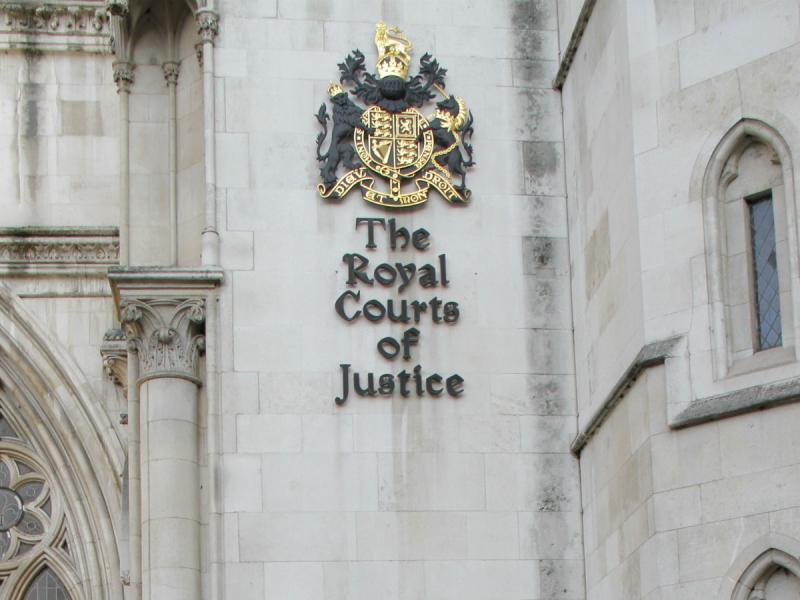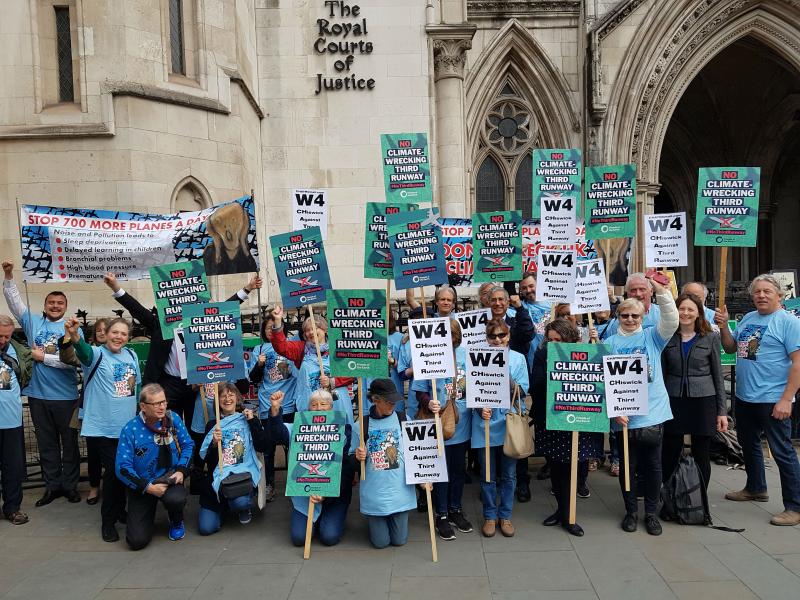Julia Eriksen, Phil Michaels Legal Scholar12 Dec 2019
Using the law is an important tool in protecting the environment. Judicial review is the mechanism we successfully used to challenge the government’s decision to expand Heathrow Airport, without properly considering the effects of climate change on future generations.
But our new report "A Pillar of Justice" reveals how changes to the law are making it more difficult to stop environmental destruction.
Every day public authorities make decisions that impact on our lives and the state of our environment. Record levels of global heating and wildlife loss are clearly showing their failings. People are angry. We’ve seen children on school strikes and pensioners chaining themselves to lorries. These conflicts and public protest will only escalate unless people are confident that they can hold authorities to account and can access justice when they need to.
It has never been more critical to protect the public’s right to meaningful participation in environmental decision taking and to challenge authorities on the legality of their decisions. Fortunately, under the Aarhus Convention, the UK is legally required to protect such rights.
Access to justice eroded
However, our latest report "A Pillar of Justice" reveals that legislative reforms are preventing people’s access to justice. We have collected data from the Ministry of Justice (MoJ) which shows a system that appears to be increasingly difficult for claimants challenging environmental decisions.
We believe that the administration of justice in environmental matters should be rebalanced. It is in the public interest for claimants to be able to bring effective challenges to controversial environmental decisions. This requires public confidence in the legal system to be a fair process within which a complaint is properly heard. The government should not shy away from this – but its reforms have made it harder for claimants and the numbers of claims being brought forward is declining.
The Aarhus Convention and UK implementation
The Aarhus Convention was built on three fundamental rights; the right to access to information, public participation and access to justice. The Convention protects people’s right to find out about environmental issues, shape laws and policies, participate in environmental decisions, and enforce environmental law through broad access to the courts with effective remedies.
These rights are necessary to ensure that present and future generations can live in a healthy environment and are able to contribute to its protection and improvement. Friends of the Earth is proud that its lawyers played a big part in the design and development of this progressive environmental treaty.
The UK formally ratified the Convention in 2005 and after the adoption of EU Directives on environmental information and public participation, was deemed compliant with two of the three rights. The outstanding obligation, to guarantee the right to access to justice, relied on the existing process of judicial review (JR). JR is a legal mechanism that allows people and communities to challenge the legality of a public body’s decision.
Why JR matters
JR is the strongest way to force a public authority to act lawfully in the future and can be used to clarify a point of law. For organisations such as Friends of the Earth, JR plays a key role in our legal campaign work. For example, in 2007 Friends of the Earth successfully acted as solicitors in a case that challenged the Forestry Commission’s decision to allow the deforestation of woodland without conducting an Environmental Impact Assessment (EIA). On the same day as permission was granted, an injunction was awarded that stopped imminent chain-sawing until the hearing. Eventually, the decision of the Commission was quashed, and the woodland was saved in a major success for the local community and beyond. The courts clarified that in cases of deforestation for the purpose of developing the land, an EIA must be conducted for the whole project.
UK implementation
As such a pivotal tool for the democratic accountability of public bodies, it is essential that it operates well. This means being fair, equitable, timely and not prohibitively expensive, and with strong standards of review applied which allow access to effective remedies.
After widespread public concern about UK compliance with some of these requirements, a bespoke costs protection regime for environmental cases was introduced in 2013. This was largely well received and led to both an increase in the number of environmental cases being brought and the number of successful claims. Since 2015 however the government has adopted several changes to the legislative framework that have had a chilling effect on access to environmental justice. Prior to their introduction in 2015 and 2017, these legislative reforms were heavily criticised by the public who feared they would discourage claims or undermine the system, for example by creating uncertainty around costs (95% of consultation responses were against proposed changes to the costs protection system in 2017).1
Friends of the Earth has raised complaints on these issues with the Aarhus Convention Compliance Committee who have consistently concluded that the UK is not only in breach of its international obligations but moving further away from compliance following the reforms. Nevertheless, the government has persisted, justifying such reforms as deterring ‘unmeritous’ environmental claims and to stop nuisance JR applications acting as a brake on economic growth.2
The chilling effect on access to justice
Our report uses the data MoJ has provided us with to assess the impact of these legislative reforms on access to justice for environmental matters. It reveals four worrying trends:
- an increase in challenges by defendant public bodies to the status of Aarhus Convention claims - thus potentially removing costs protection for claimants
- a fall in cases being granted permission to proceed
- an overall fall in success rate at trial
- a falling number of claims being brought in the first place (likely as a result of the above).
This exposes an uninviting and challenging system for claimants that can - and evidently does - deter claimants from pursuing environmental JRs.
Loss of confidence
We are concerned for several reasons. Above all, the fall in the number of claims being brought reflects a loss of public confidence in the very justice system that is meant to give power to people to hold their government to account - a core pillar of a working democracy. If people have no confidence in being fairly treated, then the justice system does not work.
Disproportionate impact on public interest
If the process of checking the abuse of power is weakened the impacts are significant and disproportionate. Often JRs brought by an individual or NGO raise issues that are of broad public interest. When such environmental cases are not being heard there can be wider societal and negative impacts as their value extends far beyond the named claimants.
Priced out of justice
The report shows that the public is effectively being priced out of justice. Changes such as being able to vary the cost cap brings greater financial uncertainty and risk to claimants that prevent their taking part in justice processes. This has the most impact on the poorest and most vulnerable in society who are also predicted to be most affected by poor environmental decisions.3
Is this all due to legislative reform?
The fall in the number of JR claims can be largely attributed to legislative reforms since 2015 and increased financial uncertainty for claimants since 2017. The system has also enabled more hostile behaviour by public bodies defending themselves against claims which has contributed too.
Are judges less sympathetic to environmental complaints?
However, the explanation for the fall in success rates at permission and hearing stages is not as readily explainable and is very concerning. It could be that this reflects a trend of lawful decisions being made (or that public bodies are getting better at defending them). But could it also reflect a shift in judicial culture due to successive governments reacting with hostility to environmental claimants?
After all, between 2013 and 2015, success rates were increasing alongside the increasing number of environmental claims too. This trend needs closer analysis. But the MoJ’s absence of a system in place to monitor the impact of their subsequent reforms has made this difficult. And we now know these reforms are having a negative effect on access to justice.
Call for compliance, credibility and confidence
Friends of the Earth has a long history of working to protect and extend the space for access to justice. Our lawyers have been part of the process from the first steps of drafting the Aarhus Convention in 1998, to successfully bringing the government to court in 2018 for their changes to the rules governing costs protection for claimants, negatively impacting on the convention’s fundamental rights to avoid prohibitive expense in accessing justice4
Today, we again call on the UK to comply with their international obligations.
We already have an established international framework to guide and improve the relationship between people and governments. What we need now is a credible and confident government that fully implements this framework and recognises the importance of access to justice in creating the space in which it can flourish. Our report closes with a list of recommendations including a full review into the phenomenon of falling success rates, re-establishing upper limits to cost caps and clearer rules to ensure claimants receive the full benefit of Aarhus protections.
- 1https://consult.justice.gov.uk/digital-communications/costs-protection-in-environmental-claims/results/costs-protection-in-environmental-claims-govt-response.pdf
- 2https://consult.justice.gov.uk/digital-communications/costs-protection-in-environmental-claims/results/costs-protection-in-environmental-claims-govt-response.pdf
- 3https://www.jrf.org.uk/report/climate-change-and-social-justice-evidence-review
- 4https://friendsoftheearth.uk/legal-and-planning/using-law-defend-environment




